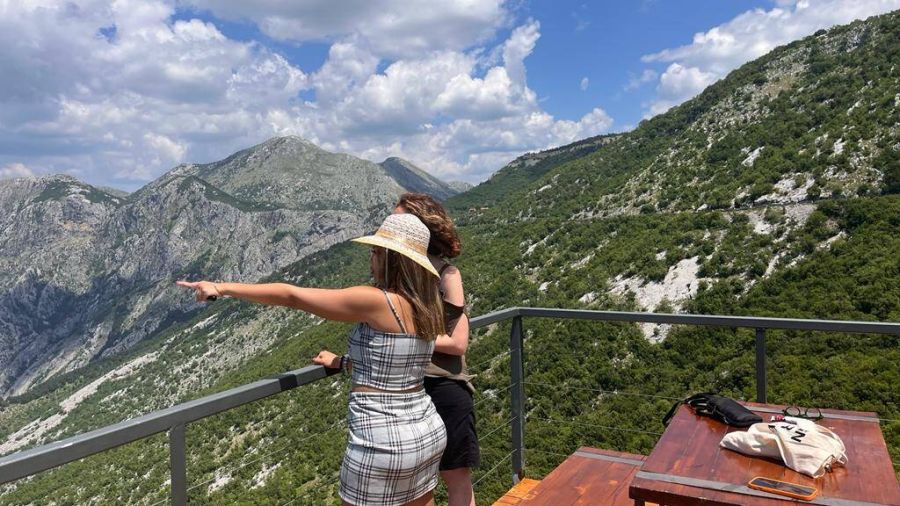
1. Stable and Safe
Montenegro is a highly stable country in Southeast Europe that maintains peaceful relations with its neighbors and is a member of NATO. While not yet a member of the European Union, it is currently in negotiations and already uses the Euro as its currency. While it is not part of the Schengen zone, crossing from the EU into Montenegro is simple.
2. Small Community with Good Infrastructure
Montenegro is a small nation with a population of only 625,000 people. This appeals to many people looking for a simpler and more tranquil way of life without being cut off from the comforts of the developed world.
Crime is low and the streets feel safe. The cost of living is very affordable by European standards.
The internet connection in Montenegro is fast and reliable. Regular speeds can reach up to 50 Mbps. In addition, the mobile internet network in Montenegro is also amazing! A tourist sim card is very cheap with 100GB of data. Some plans also offer 500GB for only around 10-15 EUR in one month! Now you won’t have a hard time calling or texting your friends or family while you’re away from home.
3. The mix of Natural Wonders
Montenegro has clean Adriatic rock beaches that enjoy a Mediterranean climate. It also has an impressive mountainous interior covered in rich forests ideal for hiking. You can discover the Dinaric Alps, which contain 18 glacial lakes and the world’s second-largest canyon.
There are many ancient, fortified cities and beautiful coastal towns. While Montenegro is popular in the summer, it is nowhere near as touristy as nearby countries.
4. The VISA situation
To apply for the visa, you must first check the visa regime for entering In Montenegro from the country you are coming from.
If you need a visa to come to Montenegro, choose the closest Embassy of Montenegro and apply for the Type D long-term visa and follow the procedure given by the Embassy.
If you do not need a visa to enter Montenegro and you want to stay in the country as a digital nomad, after your arrival you need to report to the Ministry of Interior and apply for a residence permit and follow the necessary regulation.
5. Best Cities for Digital Nomads
If you do decide to head to Montenegro as a digital nomad, where should you be considering basing yourself?
Podgorica
If you want the convenience of good Wi-Fi and things like yoga studios and fully equipped gyms, then the capital city, which is home to about 30% of the population, is your best choice. It is very close to the coast, but not on the coast. Instead, it sits on the beautiful Lake Skadar, which is also a national park.
Podgorica is actually quite a bit cheaper than some of the coastal towns, which had a more touristy feel. You can expect to get your own apartment in the city center for just $300 per month.
Budva
This town is on the Adriatic coast and is the hub of the country’s tourist industry. It is a classic fortified medieval town quite similar to nearby Dubrovnik in Croatia. It also has a great collection of Adriatic beaches serviced by many resorts.
Kotor
Kotor is also a coastal town, and its Old Town has UNESCO heritage status. The town has a lot of luxury hotels, quality restaurants, and pumping nightclubs to serve tourists, but is much quieter in the off-season. It also tends to be a bit cooler in temperature than many of the other beach towns.
6. Active But Not Saturated Digital Nomad Community
Since Montenegro has just started getting more and more popular with Digital Nomads, you won’t find a lot of them here. However, you don’t need to worry as there’s an active community where you can meet people who do the same thing as you. You can join the Montenegro Digital Nomads & Remote Workers, an active Facebook group.

In this group, you’ll find a lot of information needed while staying in the country. You can read and share experiences with others in order to have a smoother stay in Montenegro. Another best thing about this group is that you’ll get the latest update and news relating to job offers, procedures, and legal processing of documents upon living in Montenegro as a Digital Nomad!
7. Locals are friendly, nice and mostly speak English
Montenegrins are known to be warm, welcoming, and friendly people. Although not all of them speak English, you can expect that you are very welcome just by their gestures. Because of this, it is easy to make friends with the locals, especially those who can communicate in English. They can help you adjust to the lifestyle and culture in Montenegro.

















